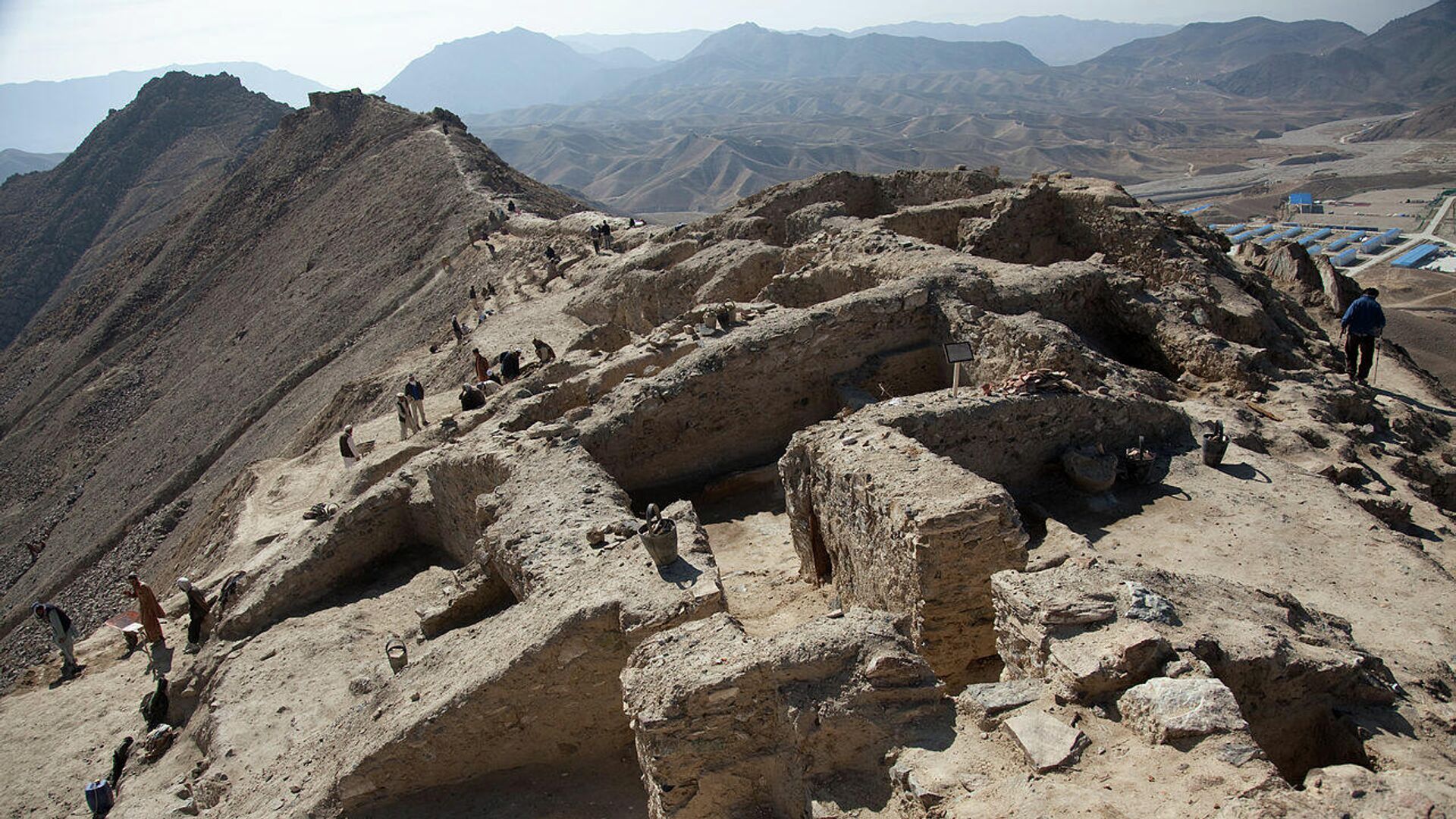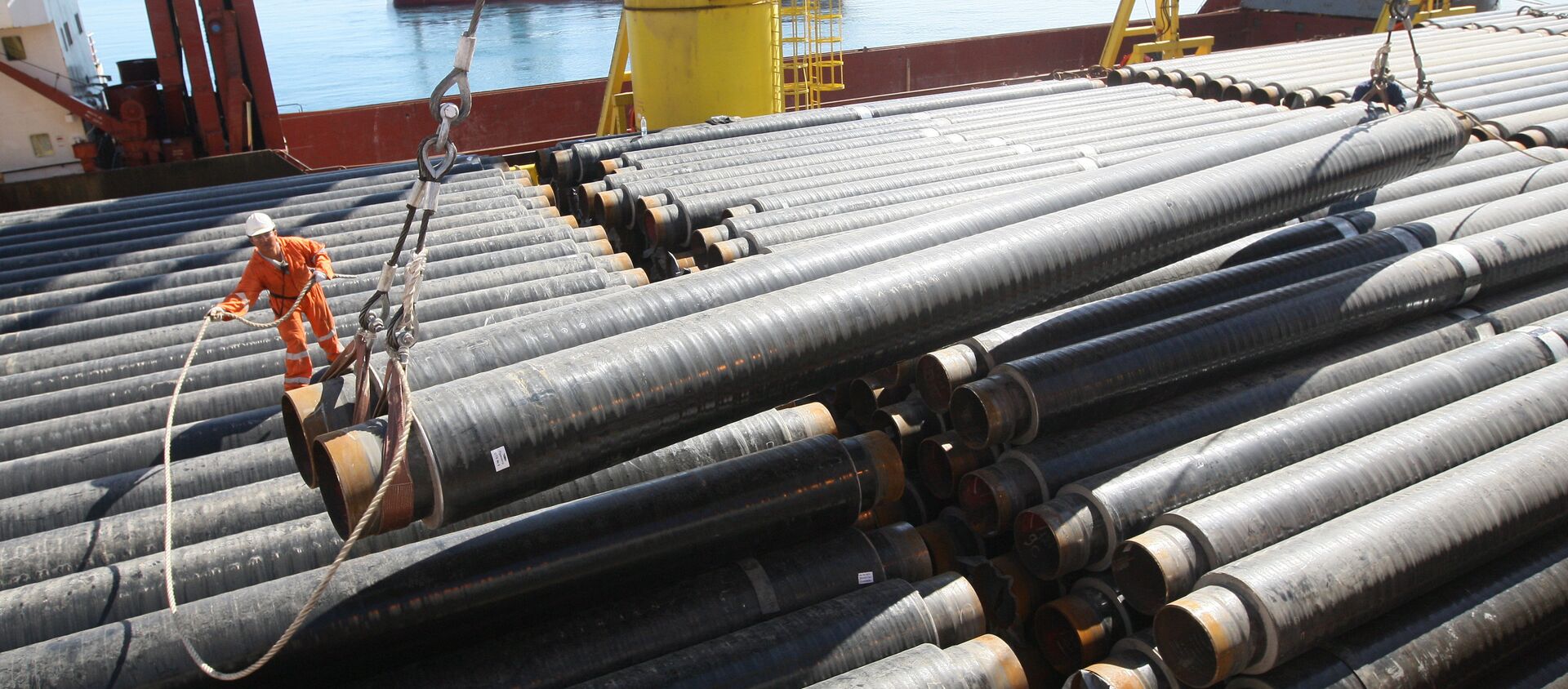https://sputnikglobe.com/20211211/ex-envoy-russia-believes-pakistan-right-conduit-to-approach-taliban-ties-with-india-still-strong-1091419620.html
Ex-Envoy: Russia Believes Pakistan 'Right Conduit' to Approach Taliban, Ties With India Still Strong
Ex-Envoy: Russia Believes Pakistan 'Right Conduit' to Approach Taliban, Ties With India Still Strong
Sputnik International
While New Delhi has repeatedly expressed concerns over what it calls Pakistan-backed terrorist groups gaining a foothold in Taliban*-controlled Afghanistan, Moscow has been worried about extremist activity from Afghanistan spilling over into central Asia.
2021-12-11T15:10+0000
2021-12-11T15:10+0000
2022-12-08T18:02+0000
afghanistan
central asia
russia
vladimir putin
china
afghanistan
taliban
pakistan
https://cdn1.img.sputnikglobe.com/img/07e5/09/0e/1089064030_0:0:1280:720_1920x0_80_0_0_3e8cd9508675e0dc545f709bb90a00b4.jpg
The ongoing situation in Afghanistan was one of the main areas of discussions between Indian Prime Minister Narendra Modi and Russian President Vladimir Putin during the 21st Annual Summit between the two leaders in New Delhi on 7 December.Shringla also said that there was a lot of “emphasis” on “counter-terrorism” during the Modi-Putin meeting, the first between the two leaders since September 2019.“I think you will find that there was fairly a joint sense on how to deal with terrorist entities such as ISIS** [Daesh in Arabic], al-Qaeda**, Lashkar-e-Taiba (LeT) and other entities that are functioning in our neighbourhood,” he stated.While the Taliban’s victory in Afghanistan has prompted India to all but end its diplomatic presence in the Central Asian nation, Russia is looking to step up its role as a net security provider in the region. In the process, Moscow has been increasing its official engagements with Islamabad, be it under the "Extended Troika" format or on a bilateral level.Pakistan has repeatedly expressed reservations over New Delhi's involvement in Afghanistan, calling it a "spoiler". Islamabad has even accused New Delhi of supporting terrorist groups against Pakistan in Afghanistan under the Ashraf Ghani administration.On the other hand, several observers in India have expressed unease over growing Pakistan-Russia ties.Sputnik spoke to former Indian Ambassador Anil Trigunayat on Russia's emerging security dynamics in the region. Trigunayat is currently a Distinguished Fellow at New Delhi-based think tank Vivekananda International Foundation (VIF).Edited excerpts:Sputnik: How do you view Russia's policy towards Afghanistan after the US troop withdrawal?Ambassador Anil Trigunayat: Both India and Russia have suffered from the consequences of terrorism in their own ways. In India’s case, most of this terrorist activity has been perpetrated as cross-border terrorism, with the backing of the Pakistani ‘deep state’ [a reference to Pakistani security and intelligence agencies Delhi believes back anti-India terrorist groupings].Moscow very well understands India’s concerns vis-à-vis terrorism and comments to zero tolerance for terrorism. This commitment has been repeatedly reflected in bilateral statements as well as interactions between India and Russia in multilateral groupings such as Russia-India-China (RIC), BRICS or the Shanghai Cooperation Organisation (SCO) for that matter.The strong commitment against terrorism has also been institutionalized in the overall bilateral relationship now.So, both India and Russia are seeking assurances from the Taliban that it will adhere to the red lines drawn by them and the international community in general when it comes to the fight against terrorism.Sputnik: Are Russia and India on the same page as far as their respective strategies in Afghanistan are concerned? Is potential terrorist activity emanating from Afghanistan the biggest challenge for both nations now?Ambassador Trigunayat: India did not believe in the good Taliban and bad Taliban. Despite Russia’s contacts with the Taliban, the group still remains a proscribed one under Russian law.Sputnik: How do you view the growing defence and economic ties between Russia and Pakistan? Is it a cause of concern for India, given Pakistan has described New Delhi as a ‘spoiler’ in Afghanistan and is suspicious of its intentions there?Ambassador Trigunayat: In my view, Russia's outreach to Pakistan is driven by at least three factors.Secondly, given the prevailing geopolitics and contests, it makes sense for Moscow to side with Beijing, which in turn is closely aligning its Afghanistan policy with that of Pakistan.Thirdly, an evolving world order, in which India is growing closer to the US, could also have prompted Moscow to show more openness towards Islamabad.I would also say that India also provides Russia with a strategic balancing pivot in its geopolitical and economic contests with the West as well as China.Besides, Moscow very well acknowledges India’s developmental contributions in Afghanistan over the last two decades. It also views India playing a potential role in the betterment of Afghanistan, against the backdrop of an impending humanitarian crisis. That’s why Russia has agreed to create a high-level mechanism to coordinate its position on Afghanistan with India as we go forward.Sputnik: How crucial is stability in Afghanistan from Russia's perspective?Ambassador Trigunayat: I think that Russia wants a stable Afghanistan otherwise it may again generate greater power games for which there is less appetite on all sides.The Central Asian region has been Russia’s backyard and Moscow would definitely be wary of the threats from terrorist groups gaining ground in Afghanistan as well as the prospect of increased drug trafficking from Afghanistan into central, south and west Asia. The terror activity could easily spill over in central Asia close to Russia’s borders.*Organization is under UN sanctions over terrorist activities** Terrorist organisation banned in Russia and many other countries
https://sputnikglobe.com/20211206/from-trade-to-space-cooperation-highlights-of-putin-modi-talks-at-21st-india-russia-annual-summit-1091289666.html
https://sputnikglobe.com/20210917/sco-summit-putin-calls-for-common-line-on-afghanistan-in-wake-of-us-flight-1089150825.html
https://sputnikglobe.com/20210528/russia-pakistan-ink-deal-to-build-pakistan-stream-gas-pipeline-1083021754.html
https://sputnikglobe.com/20210823/resistance-to-taliban-may-result-in-long-term-civil-war-in-afghanistan-csto-says-1083692402.html
central asia
china
afghanistan
pakistan
Sputnik International
feedback@sputniknews.com
+74956456601
MIA „Rosiya Segodnya“
2021
News
en_EN
Sputnik International
feedback@sputniknews.com
+74956456601
MIA „Rosiya Segodnya“
Sputnik International
feedback@sputniknews.com
+74956456601
MIA „Rosiya Segodnya“
india-russia bilateral relations, situation in afghanistan, pakistan
india-russia bilateral relations, situation in afghanistan, pakistan
Ex-Envoy: Russia Believes Pakistan 'Right Conduit' to Approach Taliban, Ties With India Still Strong
15:10 GMT 11.12.2021 (Updated: 18:02 GMT 08.12.2022) While New Delhi has repeatedly expressed concerns over what it calls Pakistan-backed terrorist groups gaining a foothold in Taliban*-controlled Afghanistan, Moscow has been worried about extremist activity from Afghanistan spilling over into central Asia.
The ongoing situation in Afghanistan was one of the main areas of discussions between Indian Prime Minister Narendra Modi and Russian President Vladimir Putin during the
21st Annual Summit between the two leaders in New Delhi on 7 December.
“Both sides were also very clear that Afghanistan territory should not be used for sheltering training or planning, financing any acts of terrorism. There were, of course, concerns over the issue of drugs and other concerns that could emanate from Afghanistan,” said Indian Foreign Secretary Harsh Vardhan Shringla, while addressing reporters on the outcomes of the meeting between the two leaders.
Shringla also said that there was a lot of “emphasis” on “counter-terrorism” during the Modi-Putin meeting, the first between the two leaders since September 2019.
“I think you will find that there was fairly a joint sense on how to deal with terrorist entities such as ISIS** [Daesh in Arabic], al-Qaeda**, Lashkar-e-Taiba (LeT) and other entities that are functioning in our neighbourhood,” he stated.
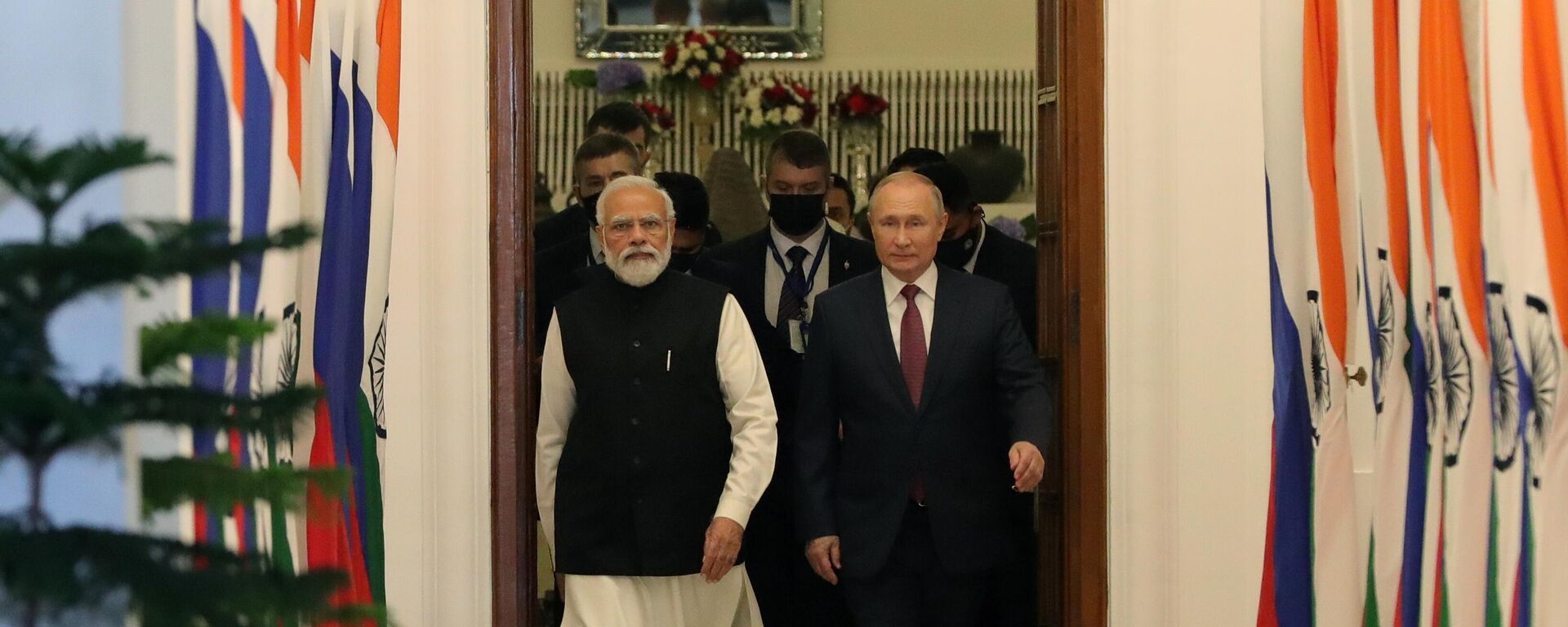
6 December 2021, 19:00 GMT
While the Taliban’s victory in Afghanistan has prompted India to all but end its diplomatic presence in the Central Asian nation, Russia is looking to step up its role as a
net security provider in the region. In the process, Moscow has been increasing its official engagements with Islamabad, be it under the "Extended Troika" format or on a bilateral level.
Pakistan has repeatedly expressed reservations over New Delhi's involvement in Afghanistan, calling it a "
spoiler". Islamabad has even accused New Delhi of supporting terrorist groups against Pakistan in Afghanistan under the Ashraf Ghani administration.
On the other hand, several observers in India have
expressed unease over growing Pakistan-Russia ties.
Sputnik spoke to former Indian Ambassador Anil Trigunayat on Russia's emerging security dynamics in the region. Trigunayat is currently a Distinguished Fellow at New Delhi-based think tank Vivekananda International Foundation (VIF).
Sputnik: How do you view Russia's policy towards Afghanistan after the US troop withdrawal?
Ambassador Anil Trigunayat: Both India and Russia have suffered from the consequences of terrorism in their own ways. In India’s case, most of this terrorist activity has been perpetrated as cross-border terrorism, with the backing of the Pakistani ‘deep state’ [a reference to Pakistani security and intelligence agencies Delhi believes back anti-India terrorist groupings].
Moscow very well understands India’s concerns vis-à-vis terrorism and comments to zero tolerance for terrorism. This commitment has been repeatedly reflected in bilateral statements as well as interactions between India and Russia in multilateral groupings such as Russia-India-China (RIC), BRICS or the Shanghai Cooperation Organisation (SCO) for that matter.
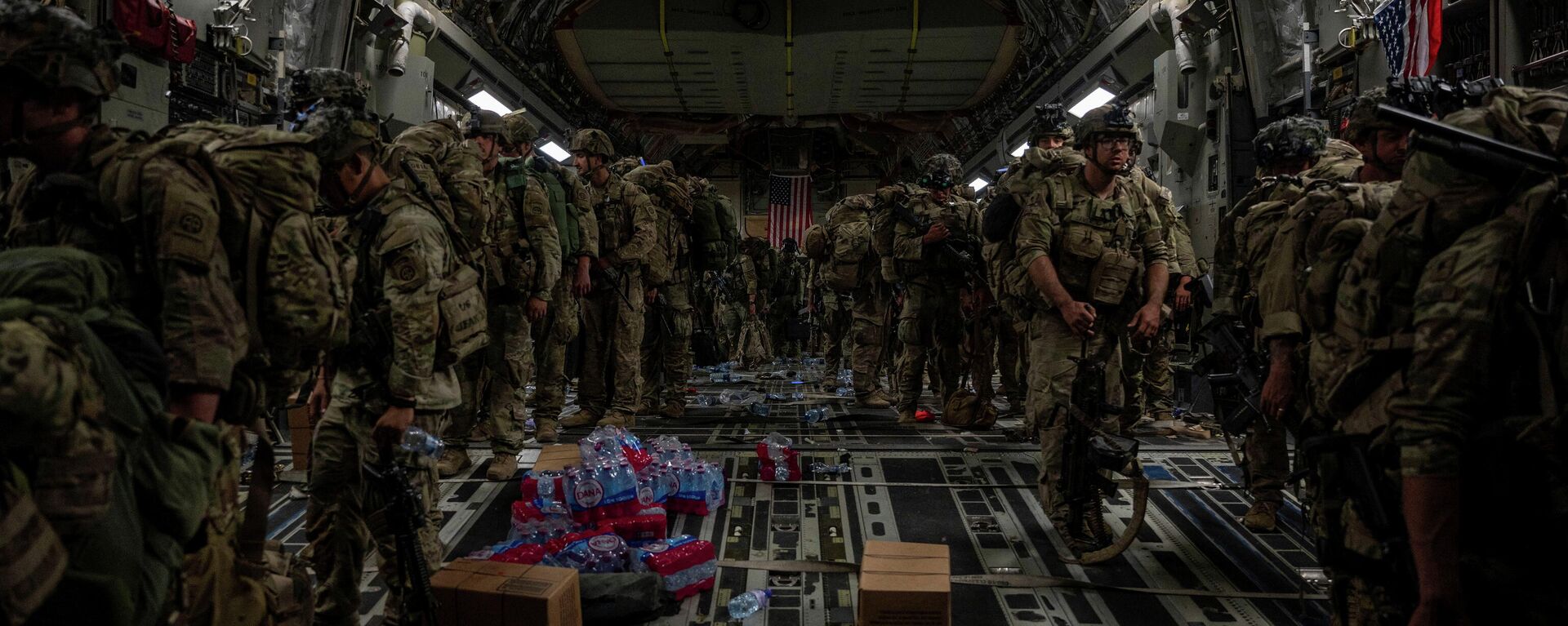
17 September 2021, 07:48 GMT
The strong commitment against terrorism has also been institutionalized in the overall bilateral relationship now.
Any resurgence of terrorism in Afghanistan will affect south and central Asian countries more than other regions. In Russia’s case, it is definitely concerned about the terror fallout from Afghanistan into central Asia and eventually into its own territory. Then, there is another significant issue of trafficking of drugs from Afghanistan into the neighbouring regions.
So, both India and Russia are seeking assurances from the Taliban that it will adhere to the red lines drawn by them and the international community in general when it comes to the fight against terrorism.
Sputnik: Are Russia and India on the same page as far as their respective strategies in Afghanistan are concerned? Is potential terrorist activity emanating from Afghanistan the biggest challenge for both nations now?
Ambassador Trigunayat: India did not believe in the good Taliban and bad Taliban. Despite Russia’s contacts with the Taliban, the group still remains a proscribed one under Russian law.
I would say that, broadly, both India and Russia are on the same page and have predicated Taliban's recognition on how soon it could fulfil its obligations prescribed in the United Nations Security Council (UNSC) Resolution 2593 [calls upon Taliban to form an inclusive government and cut ties with terror groups targetting other nations. It was passed in August when India was the rotating chair of the UNSC].
Sputnik: How do you view the growing defence and economic ties between Russia and Pakistan? Is it a cause of concern for India, given Pakistan has described New Delhi as a ‘spoiler’ in Afghanistan and is suspicious of its intentions there?
Ambassador Trigunayat: In my view, Russia's outreach to Pakistan is driven by at least three factors.
Firstly, it believes that Islamabad is the right conduit to reach out to the Taliban, which I believe is a valid approach due to the Pakistani military’s influence on the Haqqani Group, which is now a major power-broker in the Taliban movement.
Secondly, given the prevailing geopolitics and contests, it makes sense for Moscow to side with Beijing, which in turn is closely aligning its Afghanistan policy with that of Pakistan.
Thirdly, an evolving world order, in which India is growing closer to the US, could also have prompted Moscow to show more openness towards Islamabad.
Having factored in all these things, it is still not a zero-sum equation as far as Russia-India ties are concerned. The recent visit of Russian President Vladimir Putin to India for the 21st Annual Summit clearly indicates that bilateral relations between Moscow and New Delhi are still going strong, in spite of the evolving geopolitical scenario.
I would also say that India also provides Russia with a strategic balancing pivot in its geopolitical and economic contests with the West as well as China.
Besides, Moscow very well acknowledges India’s developmental contributions in Afghanistan over the last two decades. It also views India playing a potential role in the betterment of Afghanistan, against the backdrop of an impending humanitarian crisis. That’s why Russia has agreed to create a high-level mechanism to coordinate its position on Afghanistan with India as we go forward.
Sputnik: How crucial is stability in Afghanistan from Russia's perspective?
Ambassador Trigunayat: I think that Russia wants a stable Afghanistan otherwise it may again generate greater power games for which there is less appetite on all sides.
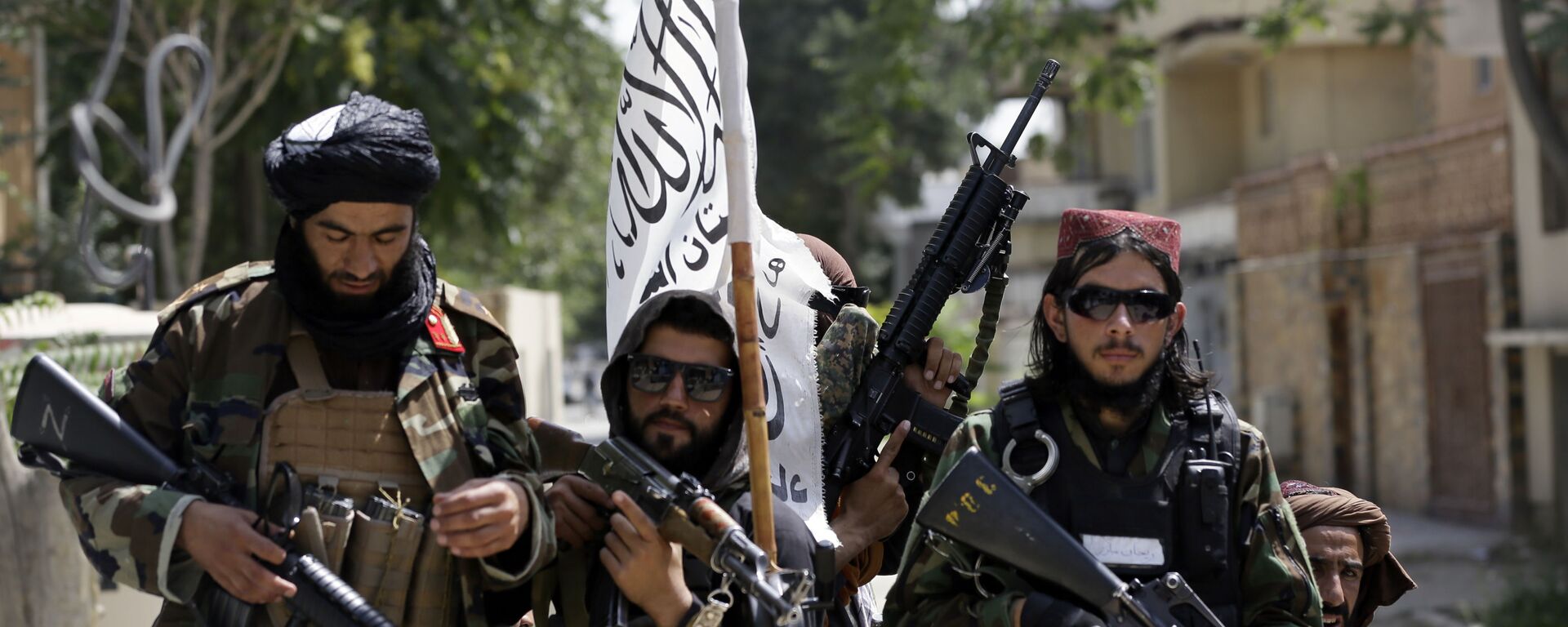
23 August 2021, 12:42 GMT
The Central Asian region has been Russia’s backyard and Moscow would definitely be wary of the threats from terrorist groups gaining ground in Afghanistan as well as the prospect of increased drug trafficking from Afghanistan into central, south and west Asia. The terror activity could easily spill over in central Asia close to Russia’s borders.
I would also say that Russia wouldn’t want China to become the sole player in central Asia and the region, and that’s why it would continue to be invested there, enabling it to protect her regional Eurasian interests through various partners and mechanisms.
*Organization is under UN sanctions over terrorist activities
** Terrorist organisation banned in Russia and many other countries


